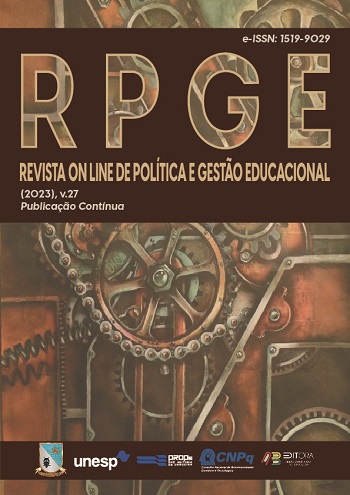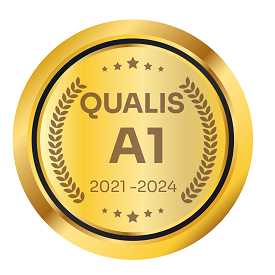Impacto de la educación en simulación en el desarrollo de habilidades profesionales de los estudiantes
Futuros trabajadores médicos y sociales
DOI:
https://doi.org/10.22633/rpge.v27i00.18193Palabras clave:
Pedagogia, Simulação Educacional, Medicamento, Assistência Médica e Social de EmergênciaResumen
El propósito del estudio es determinar el efecto de la educación de simulación en el desarrollo de las habilidades profesionales de los estudiantes. Los autores utilizaron el método analítico de encuesta, con la participación de expertos para evaluar la calidad de las fuentes. Los resultados del estudio muestran que, si bien la capacitación con simulación brinda un entorno seguro y controlado, los estudiantes pueden practicar y desarrollar sus habilidades, lo que garantiza que estén bien preparados para manejar las demandas y presiones de las situaciones del mundo real. A través de estas experiencias, los estudiantes pueden aplicar sus conocimientos, habilidades para la toma de decisiones y habilidades técnicas para gestionar eficazmente situaciones críticas. Al integrar el aprendizaje de simulación en el plan de estudios, las instituciones educativas pueden proporcionar a los estudiantes los conocimientos necesarios para desarrollar habilidades y competencias profesionales.
Descargas
Citas
ALEKSEEV, E. et al. Problems of the efficiency of ensuring environmental security: development of constitutional and legal norms. Lex Humana, v. 15, n. 2, p. 473–486, 2023.
BIRD, S.; FAIRWEATHER, C. B. Military Fatality Rates (by Cause) in Afghanistan and Iraq: a Measure of Hostilities. The International Journal of Epidemiology, v. 36, n. 4, p. 841-846, 2007. DOI: 10.1093/ije/dym103.
BRIDGES, E.; SEERY, G.; ORR, R. The Need for Tactical Medicine Training in Modern Warfare. Military Medicine, v. 186, n. 1-2, p. e12-e16, 2021.
CHEREMISIN, P. A. et al. a digitalization as a new educational paradigm. Revista on line de Política e Gestão Educacional, v. 26, n. esp.2, 2022. DOI: 10.22633/rpge.v26iesp.2.16558.
CHIZH, I. M.; RUSANOV, S. N.; KARPENKO, I. V. Novye metodologicheskie podkhody k podgotovke vypusknikov meditsinskikh vuzov k rabote v usloviiakh chrezvychainykh situatsii [New methodological approaches to training medical university graduates to work in emergency situations]. Clinical Medicine, v. 96, n. 9, p. 847-852, 2018.
EUBANKS, A. A.; VOLNER, K.; LOPREIATO, J. O. Past Present and Future of Simulation in Military Medicine. Treasure Island (FL): StatPearls Publishing, 2022.
GADZAOVA, L. et al. Conditions and opportunities of subject-based learning at universities and its impact on students’ linguistic competence. Revista Conrado, v. 19, n. 90, p. 107-111, 2023.
GLASSBERG, E. et al. Moving Forward with Combat Casualty Care: the IDF-MC Strategic Force Buildup Plan “My Brother’s Keeper”. Israel Medical Association Journal, v. 16, n. 8, p. 469-474, 2014.
HORDIEIEV, V. et al. Application of innovative technologies in the educational process: psychological and pedagogical aspect. Synesis, v. 15, n. 2, p. 132–143, 2023.
JEN HENG, P.; EVELYN, W.; LATEEF, F. Simulation Training for Emergency Teams. Education in Medicine Journal, v. 7, n. 4, p. 37-44, 2015.
KURGANSKY, S. I.; KOVALENKO, E. V.; SOKOLOVA, O. A. Cooperation of training individuals as a methodological basis for enriching the experience of social interaction in young students. Interacción y Perspectiva, v. 13, n. 1, p. 39-49, 2022.
LINDE, A. S.; MCGINNIS, L. J.; THOMPSON, D. M. Multi-Battle Domain-Perspective in Military Medical Simulation Trauma Training. Journal of Trauma and Treatment, v. 6, n. 4, 2017. DOI: 10.4172/2167-1222.1000391.
LOTERO VASQUEZ, D. F.; GARRIDO RAAD, D. R.; RAMÍREZ PEÑA, M. Seguridad y salud en el trabajo, perspectivas metodológicas de investigación. Gaceta Médica de Caracas, v. 130, n. 4, 2022. DOI: 10.47307/gmc.2022.130.4.13.
MOSES, G. et al. Military Medical Modeling and Simulation in the 21st Century. Studies Health Technology and Informatics, v. 81, p. 322-328, 2001.
OKLA, G.; EDEN, D. Learning by Simulation. Middle East Journal of Anesthesiology, v. 23, n. 2, p. 247-250, 2015.
PISARENKO, L. V.; GUMENIUK, S. A.; POTAPOV, V. I. Osobennosti sovremennykh lokalnykh voin i vooruzhennykh konfliktov i problemy okazaniia meditsinskoi pomoshchi naseleniiu v dogospitalnom periode [Peculiarities of modern local wars and armed conflicts and problems of medical care at the prehospital phase]. Disaster Medicine, v. 4, p. 68-72, 2022. DOI: 10.33266/2070-1004-2022-4-68-72.
RABADANOVA, R. et al. Motivational support as a factor of formation of students’ professional competence in the conditions of digitalization of education. Revista on line de Política e Gestão Educacional, v. 26, n. esp.2, 2022. DOI: 10.22633/rpge.v26iesp.2.16547.
RASMUSSEN, T.E. et al. Ahead of the Curve: Sustained Innovation for Future Combat Casualty Care. Journal of Trauma and Acute Care Surgery, v. 79, n. 4, p. 61-64, 2015.
RASMUSSEN, T.E. et al. Combat Casualty Care Research for the Multidomain Battlefield. Journal of Trauma and Acute Care Surgery, v. 83, n. 1, p. 1-3, 2017.
ROSEN, K.R. The History of Medical Simulation. The Journal of Critical Care, v. 26, n. 2, p. 157-166, 2008.
SMIRNOV, N.P.; PEPELIAEV, A.V.; PORFIREV, V.A. Voenno-meditsinskaia podgotovka kursantov: ot voiskovogo opyta k innovatsiiam v obuchenii [Military-medical training of cadets: from military experience to innovations in training]. Modern high technologies, v. 12, n. 3, p. 548-551, 2015.
SMIRNOV, N. P.; RAZGONOV, V. L. Rol simuliatsionnogo obucheniia v formirovanii professionalnykh kompetentnostei u kursantov voennogo vuza [The role of simulation training in the formation of professional competencies in military university cadets]. Modern Problems of Science and Education, v. 4, p. 1-8, 2016. DOI:10.17513/spno.25047.
STROTHER, D. S.; DAVENPORT, M.; HATZFELD, J. J. Advancements in Simulation Training for Tactical Medicine: Preparing Providers for the Next Generation of Warfare. Military Medicine, v. 186, n. 3-4, p. e401-e406, 2021.
VEREMEEVA, S.; KRASNOLOBOVA, E.; GONCHARENKO, O. Innovative methods in the training of veterinarians. Revista on line de Política e Gestão Educacional, v. 26, 2022. DOI: 10.22633/rpge.v26i00.17334.
Descargas
Publicado
Cómo citar
Número
Sección
Licencia
Derechos de autor 2023 Revista on line de Política e Gestão Educacional

Esta obra está bajo una licencia internacional Creative Commons Atribución-NoComercial-CompartirIgual 4.0.
Manuscritos aceitos e publicados são de propriedade da Revista on line de Política e Gestão Educacional. É vedada a submissão integral ou parcial do manuscrito a qualquer outro periódico. A responsabilidade do conteúdo dos artigos é exclusiva dos autores. É vedada a tradução para outro idioma sem a autorização escrita do Editor ouvida a Comissão Editorial Científica.











